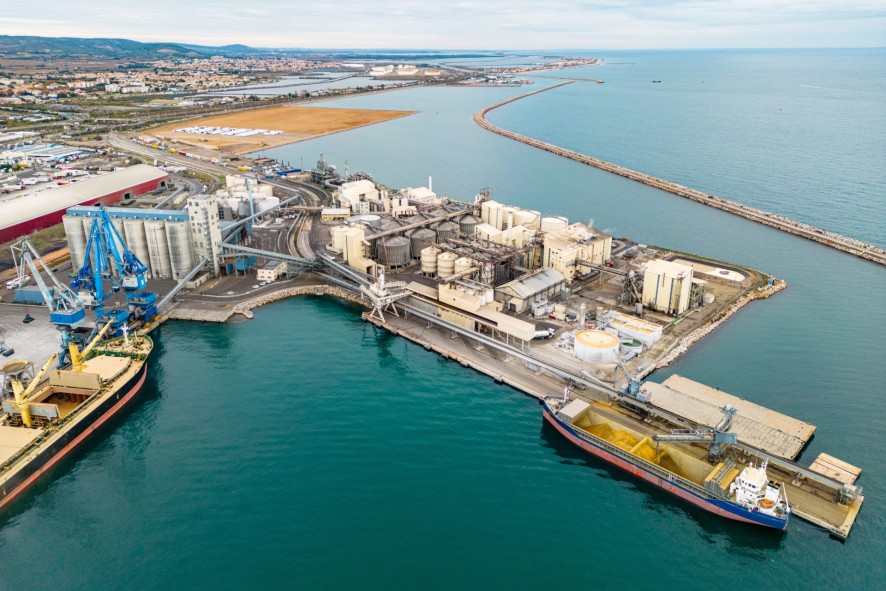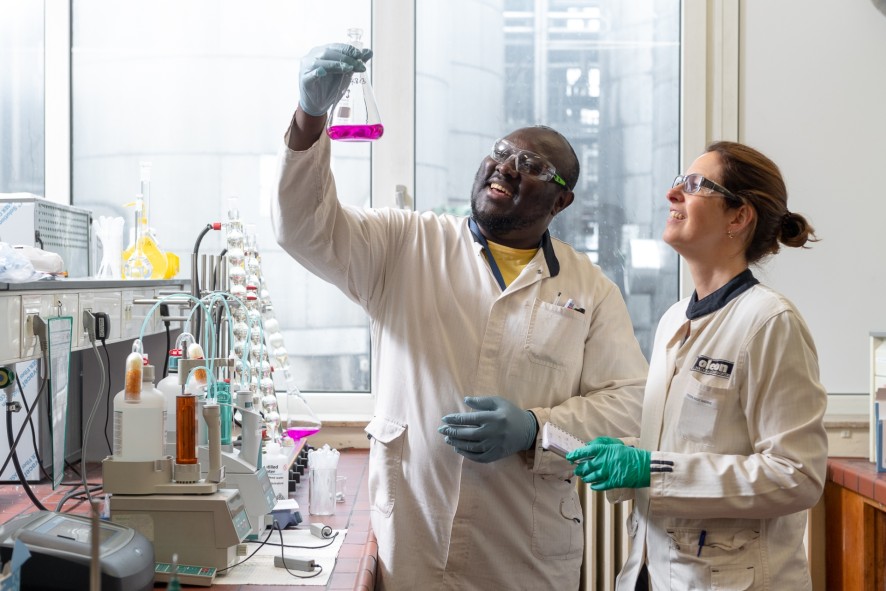Copy the URL
Copié vers le presse-papier
Highlight
As a player in the agricultural transition, Avril develops new solutions for the plant and animal sectors for more sustainable agricultural practices. As a player in the food transition, the Group is developing new specialty protein ingredients from plants and consumer products to anticipate world population growth by 2050. As a player in the environmental transition, Avril contributes to the decarbonization of industry, in particular through the development of biofuels and innovative solutions in the field of sustainable chemistry.
Paul-Joël Derian
Chief Sustainable Development and Innovation Officer, Head of Avril Development Incubator
Innovating for the agricultural transition
Avril innovates for an agriculture that evolves its practices in order to reduce its impact on the environment and that is also able to adapt quickly to climate change. A more sustainable, more resilient agriculture, to better nurture the earth, feed people and animals.
Reducing the climate impacts of agriculture
About 80% of greenhouse gas emissions on all the scopes of Avril’s carbon footprint are linked to the purchase of agricultural raw materials. It is therefore essential to contribute to reducing the environmental impact of the agricultural sectors. Supporting agricultural practices that reduce carbon emissions or store carbon in the soil is one example A cross-functional community has been created around the issue of agricultural carbon. This community brings together experts working on existing initiatives within the Group. Its purpose is to bring together internal expertise on this complex and structuring subject, to leverage collective intelligence to move current projects forward with a common vision, and to identify future opportunities for innovation.
2022 was a year of exploring innovation trajectories able to help the sector adapt rapidly to the consequences of climate change. A roadmap was drawn up collectively with the innovation and strategy teams and the subsidiaries. This will enable us to define thematic priorities to ensure that the upstream agricultural sector is able to cope with these upheavals, a major challenge that Avril wants to be able to anticipate and support.
Highlight
First of all, it appears to be a priority to support plant breeding and the development of varieties adapted to a new climate. Climate change also raises the question of how to integrate new crops into rotations. Modified earliness or accelerated production cycles may be an opportunity to study in the development of intercropping. Finally, it is necessary to consider how to support the agricultural sector in the management of increased risks, notably linked to drought but also to changes in practices.
Raphaëlle Girerd
Director of Innovation and sectors of Sofiprotéol and of the Adaptation to Climate Change platform
Innovating for the food transition
Human nutrition is changing rapidly, with profound transformations in people’s consumption habits: change to more plant–based food, search for more naturalness, promotion of local products and short-distance circuits, etc. Feeding populations is also a global sustainability issue, since by 2050, there will be 10 billion people on the planet and food needs will increase by 60% between 2010 and 2050, with only 10% more arable land available.
A collective committed to the food transition
To help meet this dual challenge, two cross-functional innovation platforms have been launched in 2022: the first dedicated to the development of new plant-based ingredients for the food industry (B2B challenge), the second focused on the development of consumer products for a healthier and more plant-based diet (B2C challenge). The two platforms are connected so that the new plant ingredients find their place in quality finished products within an integrated value chain, as promoted by Avril’s circular model for 40 years.
Highlight
The priority of the platform dedicated to new plant-based ingredients is the development of protein-rich plant ingredients for human consumption. The valorization of co-products from protein extraction is also a major challenge for profitable and sustainable business models. The platform dedicated to the development of consumer products serves Avril's commitment to transparent, healthy, tasty, practical and accessible food for all. The synergy between the two platforms aims to facilitate collaborations, pool skills and generate new breakthrough ideas.
Amandine Perez
Director of the plant-based protein program for human consumption and of the Alternative Proteins and New Natural Ingredients platform
Lesieur, committed to innovation
Lesieur has structured its innovation approach around six priorities: naturalness, nutrition for health, practicality, new distribution channels, growth markets and new categories. All subject to a primary objective: sustainability.
Highlight
Innovation according to Lesieur is done in close proximity to its ecosystem and the needs of consumers because innovation is only worthwhile if its added value is perceived by consumers and gives the Group a competitive edge. Our strategy is built on three acts: understanding and defining new territories of opportunity, incubating innovative projects with a strong technological component as well as incremental evolutions of our products, and finally developing "design thinking", a global conception method focused on the user, to better anticipate and renew the customer experience.
Frédéric Bredon
Director of innovation and quality of Lesieur and of the platform New offers for a more natural, nutritious and personalized food
Innovating for the environmental transition
Innovation at Avril is also focused on the energy and environmental transition. The objective is to identify solutions that, without affecting our ability to produce sufficient and healthy plant-based food, provide solutions for the decarbonization of transport and more sustainable chemistry. Two platforms are working to develop future renewable energies on the one hand, and green chemistry and biomaterials on the other.
Accelerating the decarbonization of transport
Biofuels are part of the energy mix and contribute to meeting the objectives of decarbonization of transport, without affecting the food sovereignty of States. While rapeseed production can meet both food and energy needs, crop innovations are emerging to enhance biofuel production. Because of their rapid growth cycle (90 days), these species help preserve soils by absorbing excess nitrogen while maintaining biodiversity. An example of an intercropping species: carinata, developed by the seed company Nuseed, optimizes the intercropping period between the harvesting of a main crop and the sowing of the following crop, to harvest a sustainable low-carbon raw material that can be used to produce sustainable biofuels. The Sète site of Saipol is set to become the world’s largest industrial unit capable of processing both Nuseed Carinata and rapeseed.
Key Figures
5 to 6 % of aviation fuels should be sustainable and non-fossil fuels by 2030.
Manufacturers and consumers are looking for more responsible products, both for their health and for the environment. The innovations of Avril’s entities help meet these growing societal expectations: Oleon breaks new ground and develops innovative processes combining enzymatic chemistry and membrane filtration. An INCITE industrial demonstrator has been built by Oleon as part of the ZENITH project, co-financed by the European Commission. The aim is to produce higher quality oleochemical esters for the health and beauty industry, using a process that reduces energy consumption and greenhouse gas emissions.
Investing in the future of the sector
Through the financial activity of Sofiprotéol, Avril is preparing the future of the sector in the general interest of its players. The FASO, Fonds d’Action Stratégique des Oléagineux et Protéagineux, is managed by Sofiprotéol on behalf of the interprofession Terres Univia. Its objective is to finance innovative research projects and collective infrastructures designed to improve the competitiveness and sustainability of production and to develop outlets for the oil and protein sector.
FASO’s 2022-2024 strategic plan focuses on four innovation themes that address both the major challenges of the industry and those of society:
- Protein sovereignty
- The agro-ecological transition
- The food transition
- The energy transition.
Focus on the support of FASO
15
innovative projects supported per year on average
30
projects in progress
60 %
of projects dedicated to agro-ecological transition









